|
|
|
Sort Order |
|
|
|
Items / Page
|
|
|
|
|
|
|
| Srl | Item |
| 1 |
ID:
076153
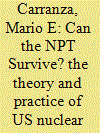

|
|
|
|
|
| Publication |
2006.
|
| Summary/Abstract |
This article examines the prospects for survival of the Nuclear Non-Proliferation Treaty in the post-9/11 world, arguing that American non-proliferation policy and the future of the NPT are inextricably linked. It discusses the shift from the Clinton administration's nuclear arms control and disarmament agenda of the mid-1990s to the Bush administration's preference for informal arms control regimes and the new policy of non-proliferation exceptionalism that distinguishes between good proliferators (India, Pakistan) and bad proliferators (North Korea, Iran). The Bush administration's penchant for unilateral foreign security policies and its double standards in implementing export restrictions on sensitive technologies while disavowing American nuclear disarmament obligations undermine the NPT bargain and endanger the treaty. The Bush administration's security-oriented strategy and acceptance of selective proliferation for balance of power purposes may lead to the emergence of a silent crowd armed with nuclear weapon capabilities. The key to preserving the relevance of the NPT is to reconnect nuclear non-proliferation with nuclear disarmament, while strengthening the treaty's enforcement machinery against non-compliers.
|
|
|
|
|
|
|
|
|
|
|
|
|
|
|
|
| 2 |
ID:
142979


|
|
|
|
|
| Summary/Abstract |
The inability of the South Asian nuclear rivals to resolve their disputes is more than a tragic failure. Their nuclear weaponry changes the nature of their disputes and makes them a global concern. The three books reviewed here stress different aspects of the India–Pakistan nuclear challenge and reveal a new wave of creativity in assessments of the causes and most promising solutions to restraining regional nuclear dangers. They do not advocate the subcontinent's denuclearization, but they make an important contribution to our understanding of the India–Pakistan nuclear conundrum, a prerequisite to bring South Asia's nuclear arms control back to the international agenda. All agree that solutions must be based on domestic willingness, but they see vital roles for elevated international pressure. Cohen and Riedel examine the potential role of China in the settlement of Indo-Pakistani disputes, and all agree that China's nuclear and missile assistance to Pakistan has had a negative impact on Indo-Pakistani relations. They all show growing interest in rethinking United States policy toward South Asia, looking at the region as a whole and integrating China into the picture, in order to adopt a comprehensive regional strategy to prevent a nuclear Armageddon in South Asia.
|
|
|
|
|
|
|
|
|
|
|
|
|
|
|
|
| 3 |
ID:
158679


|
|
|
|
|
| Summary/Abstract |
The literature on the India–Pakistan nuclear conundrum has neglected the impact of the international normative environment on India and Pakistan’s nuclear behavior. This article fills that gap, by looking at the impact of the nuclear taboo on Indo-Pakistani strategic interactions during the 1999 Kargil war and the 2002 border standoff. The nuclear taboo, rather than nuclear deterrence, explains the non-use of nuclear weapons. During both crises the nuclear taboo entered the decision-making process instrumentally, in the form of perceived reputational “costs.” The Indian and Pakistani emerging nuclear doctrines endanger a fragile nuclear taboo that would be strengthened by a bilateral non-first use accord. Whether India and Pakistan can move from an instrumental to a substantive acceptance of the nuclear taboo will depend on whether the United States and the other nuclear weapon states, included in the Nonproliferation Treaty, play the role of norm entrepreneurs and strengthen the nuclear taboo at the global level.
|
|
|
|
|
|
|
|
|
|
|
|
|
|
|
|
| 4 |
ID:
080317
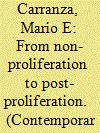

|
|
|
|
|
| Publication |
2007.
|
| Summary/Abstract |
How can the reversal in American policy toward South Asia from the Clinton administration's
strong condemnation of the Indian and Pakistani nuclear tests of May 1998
and the enforcement of American non-proliferation legislation to the lifting of sanctions
and the de facto recognition of India and Pakistan as nuclear weapon states be
explained? The Indian-American nuclear deal of March 2006/July 2007 is examined
here through alternative theoretical perspectives to explain the American reversal.
Defensive realism and social constructivism offer the strongest explanations for the
shift under the Bush administration. Both can be used to explain a deal that makes
major concessions in previous American policy. They also help draw attention to
the problems arising from a situation where the future of Indian-American relations
will depend not only on Indian but also American actions. The nuclear deal, it is concluded
here, could irreparably damage the Non-Proliferation Treaty while increasing
the danger of actual use of nuclear weapons in a future Indo-Pakistani war
|
|
|
|
|
|
|
|
|
|
|
|
|
|
|
|
| 5 |
ID:
086412
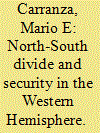

|
|
|
|
|
| Publication |
2009.
|
| Summary/Abstract |
This paper examines the economics-security nexus in US policy toward South America, and the implications for South America of the 'securitization' of US foreign economic policy during the Bush administration. There has always been a tight linkage between the US foreign economic and security agendas but the real issue is the degree of 'tightness' at a given point in time. After the Alliance for Progress lost its way the United States tended to pursue its economic and security interests in South America in separate tracks, even if preventing Soviet intrusions in the region remained in the background. Yet after the collapse of the Free Trade Area of the Americas (FTAA) negotiations in 2004 a US strategy of 'divide and conquer' through bilateral trade deals has been accompanied by a 'securitization' discourse and there are some indications that it may 'securitize' as a new threat the social movements and neopopulist regimes that oppose neoliberal economic policies. The paper discusses the limits of the securitization thesis. The conclusion examines the future of US-South American relations and argues that the United States needs to renew its commitment to genuine multilateralism and re-engage the region to establish an effective and lasting partnership for dealing with common economic and security challenges in the twenty-first century.
|
|
|
|
|
|
|
|
|
|
|
|
|
|
|
|
| 6 |
ID:
100937
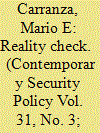

|
|
|
|
|
| Publication |
2010.
|
| Summary/Abstract |
The comparative regional analysis of American foreign policy in the era of unipolarity provides a reality check to the academic debate on American primacy after 11 September. There is disagreement among scholars on whether a liberal or neoimperial logic of global order will emerge in the 21st century, but the debate between supporters and opponents of both logics has largely ignored South America and South Asia. Whether the United States has become the global hegemon cannot be debated in the abstract, or only in relation to the traditional areas of US dominance: Europe and East Asia. Using a neo-Gramscian definition of international hegemony the article argues that the United States exercises flexible and somewhat contested hegemonies in different parts of the world. Brazil's independent foreign policy and great power status pretensions have complicated American attempts to exercise hegemony in South America. In South Asia, India has established a strategic partnership with the United States, but its strong commitment to strategic autonomy and its penchant for an independent foreign policy may become incompatible with post-11 September American grand strategy. The comparative analysis of American policy toward both regions has important implications for international relations theory, showing the need to go beyond realist explanations in order to understand American foreign policy today. The conclusion examines alternative scenarios and policy options for the United States, arguing that a post-11 September new liberal grand bargain can only be established if the United States abandons the drive for global dominance and becomes a 'normal' great power in a genuinely multilateral framework, respecting the rules of the international society of states while listening to other voices in the planet.
|
|
|
|
|
|
|
|
|
|
|
|
|
|
|
|
| 7 |
ID:
153542
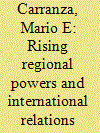

|
|
|
|
|
| Summary/Abstract |
This article explores Brazil and India's alternative paths in their search for great-power status. It examines the competing expectations of alternative IR theories regarding the conditions for great-power status in the post-Cold War era and their limited explanatory and predictive power. Although constructivism offers a more sophisticated approach, one also needs insights from realism/neorealism, neoliberal institutionalism, and globalization theory to understand the possibilities and limitations of the Brazilian and Indian strategies to be admitted to the great-power club. The article compares Brazil and India's foreign policies and nuclear diplomacy and challenges the idea that India's status as a nuclear weapon state enhances its prospects for joining the great-power club. Brazil does not possess nuclear weapons, but it has successfully created a consensual hegemonic regime in South America, which allows it to use a regionalist project (Mercosur, UNASUR) as a launching pad to gain admission to the great-power club. In contrast, despite possessing nuclear weapons, India has been unable to establish a consensual hegemonic regime in South Asia, and its “Pakistan problem” holds back her prospects for joining the great-power club. The article argues that a US blessing may not help India to gain entrance to the “board of the world” if other board members, such as China, resist India's admission. The conclusion examines the implications for IR theory of Brazil and India's alternative pathways to great-power status, and the impact of progress—or lack of progress—in global nuclear disarmament negotiations on both countries' possible admission to the great-power club.
|
|
|
|
|
|
|
|
|
|
|
|
|
|
|
|
|
|
|
|
|